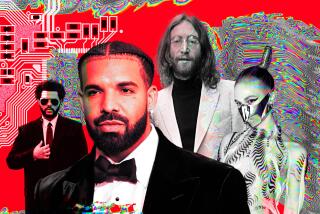EMI Backs CD-Burning Software
- Share via
Backed by a major record label, the leading supplier of CD-recording software is developing technology that lets consumers copy songs onto CDs without encouraging piracy.
Roxio Inc. of Milpitas, Calif., is expected to announce today that EMI Recorded Music is investing an undisclosed amount of money in Roxio and its new technology. The goal is to create a simple way to collect an additional fee from consumers who want to make CDs out of the songs they download.
The joint effort could help plug one of the gaping holes in the major labels’ offerings online: Most of the songs they offer for downloading or sampling cannot be burned onto a CD. That’s a problem because CD recorders have become one of the best-selling consumer-electronics devices, with more than 100 million expected to have been shipped worldwide through 2001, according to the Gartner Dataquest research firms.
No price has been set for the new version of Roxio’s software, which is expected to be available for downloading within 12 months.
Today, consumers who want to burn their own CDs have two main sources of music: They can take songs off a CD, or they can use MP3 files downloaded from the Internet. Many MP3 files, however, are unauthorized copies of songs obtained through file-swapping services such as Napster Inc.
The major labels have slowly started making their music available online, using encryption from Microsoft Corp., InterTrust Technologies and others to prevent consumers from making unauthorized copies. Although the labels could allow encrypted songs to be burned onto CDs, most do not.
One reason is the fear that once a song is on a CD, it’s free of its original encryption. That means it can be copied an unlimited number of times and distributed far and wide over the Net.
Nevertheless, Roxio Chief Executive Chris Gorog believes that consumers would be willing to pay for the right to create their own CDs. If the labels don’t enable it, he said, “they will leave a big pile of money on the table, but worse, they will encourage consumers to go to illegal sites where they can burn” the songs they download.
Gorog wants to start with software that integrates the encryption technology from the likes of Microsoft seamlessly into Roxio’s CD-recording technology. Record labels could use the software in a variety of ways, such as offering music subscription services that let consumers create compilation CDs for an additional fee.
Another example is a CD single that included, in encrypted form, the rest of the songs from the artist’s latest album. Consumers who liked the single could sample the rest of the album and, for an extra fee, burn it onto a CD themselves, said Jay Samit, an EMI senior vice president.
EMI, whose roster of artists includes the Beatles, the Rolling Stones, Janet Jackson and Frank Sinatra, wants Roxio to go a significant step further with its new software: Prevent the newly recorded CDs from being copied.
“Obviously, the whole point is to maintain whatever protection is built in [to the encrypted downloads] for our artists,” Samit said.
Roxio officials aren’t convinced that such measures are necessary or even feasible. The two companies are still discussing how far to go on that front.





